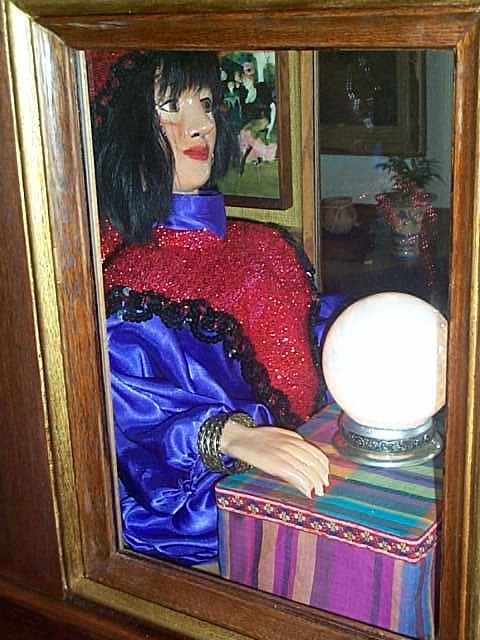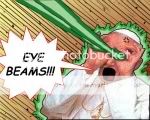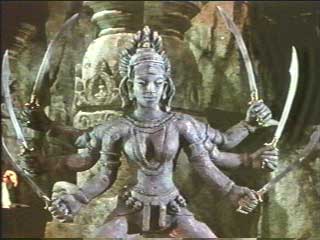Astrology Is 'Science'? Miss Cleo a 'Scientist'? Yes, Darlin!
ID Rewrites Reality

The New Stephen Hawkin: 'Caller, are ya there? Michael?' 'Yes, Dr. Cleo.' 'Ooh, I'm a doctor now, am I? Bless your heart! Thank ya, darlin!'
Behe's 15th Century Science
from Mike Argentino / The York Daily Record
HARRISBURG — Dr.
 Michael Behe, leading intellectual light of the intelligent design movement, faced a dilemma.
Michael Behe, leading intellectual light of the intelligent design movement, faced a dilemma.In order to call intelligent design a "scientific theory," he had to change the definition of the term. It seemed the definition offered by the National Academy of Science, the largest and most prestigious organization of scientists in the Western world, was inadequate to contain the scope and splendor and just plain gee-willigerness of intelligent design.
So he devised his own definition of "theory," expanding upon the definition of those stuck-in-the-21st-century scientists, those scientists who ridicule him and call his "theory" creationism in a cheap suit.
He'd show them. He'd come up with his own definition.
Details aside, his definition was broader and more inclusive of ideas that are "outside the box."
So, as we learned Tuesday, during Day 11 of the Dover Panda Trial, under his definition of a scientific theory, astrology would be a scientific theory.
Astrology?
Who knew that Jacqueline Bigar, syndicated astrology columnist, was on par with Lehigh University biochemist Michael Behe?
Eric
 Rothschild, attorney for the plaintiffs, asked Behe about whether astrology was science. And Behe, after hemming and hawing and launching into an abbreviated history of astrology and science, said, under his definition, it is. He said he wasn't a science historian, but the definition of astrology in the dictionary referred to its 15th-century roots, when it was equated with astronomy, which,
Rothschild, attorney for the plaintiffs, asked Behe about whether astrology was science. And Behe, after hemming and hawing and launching into an abbreviated history of astrology and science, said, under his definition, it is. He said he wasn't a science historian, but the definition of astrology in the dictionary referred to its 15th-century roots, when it was equated with astronomy, which, according to the National Academy of Science, is a science.
So, taking a short logical leap, something Behe would certainly endorse since he does it a lot himself, you could say that intelligent design is on par with 15th-century science.
Sounds about right.
Actually, that's not quite fair. It shortchanges astrology. For example, my personal horoscope for Tuesday, formulated by the aforementioned famous scientist Bigar, said, "Confusion could be your middle name, but many other people feel confused, too."
Nailed it.
Most of the confusion — and it just wasn't me — was brought on by Behe's second day on the witness stand. After a while, he set into a pattern.
He'd
 say critics of his idea always misunderstand him, take things out of context, and misrepresent what he means. And then, to respond to them, he misunderstood what they said, took their words out of context, and misrepresented what they said.
say critics of his idea always misunderstand him, take things out of context, and misrepresent what he means. And then, to respond to them, he misunderstood what they said, took their words out of context, and misrepresented what they said.He would point to studies that seemed to support the evolutionary view of how things developed — articles written by scientists who accept the theory of evolution and who, consequently, don't think much of Behe — and say they support his views.
And whatever his point was would be wrapped in so much verbiage you needed a backhoe to get to it. By the time you kind of grasped what he was saying, he was off talking about what a wingnut Francis Crick turned out to be. Crick was one of two scientists who discovered the double-helix structure of DNA, winning a Nobel Prize. Later, Crick came up with a notion about how life started on this planet called "Directed Panspermia." His idea was that aliens reduced life to its smallest components, or something like that, and shot them to Earth via rocket ship.
I guess the point is being a scientist and a wingnut are not mutually exclusive.
As the cross-examination continued, another pattern developed. Rothschild would show Behe a quote from Of Pandas and People and ask him a simple question about it. The quote said: "Intelligent design means that various forms of life began abruptly through an intelligent agency, with their distinctive features already intact — fish with fins and scales, birds with feather, beaks and wings, etc."
Rothschild asked him whether he believed that statement said intelligent design meant life began abruptly on this planet. It apparently was a trick question because Behe had a hard time answering it.

"I disagree," the scientist said.
And then, he explained what he thought the quotation meant, which wasn't what it said. This went on for a while. Every time Rothschild would ask Behe about a statement, some he wrote himself, he'd say he'd have to disagree that it said what it said. I expected Rothschild to ask Behe whether he was able to read and understand the English language.
At one point during Rothschild's cross-examination, the lawyer asked the scientist whether he was co-authoring a book, a follow-up to Of Pandas and People, with several other intelligent design moolahs. He said he wasn't.
The lawyer showed him depositions and reports to the court, quoting two of the other authors as saying he was a co-author.
 Behe said that he wasn't a co-author of the book but that the statements by those guys weren't false. He said one of the authors was "seeing into the future."
Behe said that he wasn't a co-author of the book but that the statements by those guys weren't false. He said one of the authors was "seeing into the future."Rothschild asked, "Is seeing into the future one of the powers of the intelligent-design movement?"
Behe didn't answer.
He didn't have to.
Seeing into the future is the province of that other science — you know, astrology.

The New Periodic Table: Soon, you will be able to major in Capricorn, with a minor in Goat Entrails. Thank you, Intelligent Design!




























0 Comments:
Post a Comment
<< Home